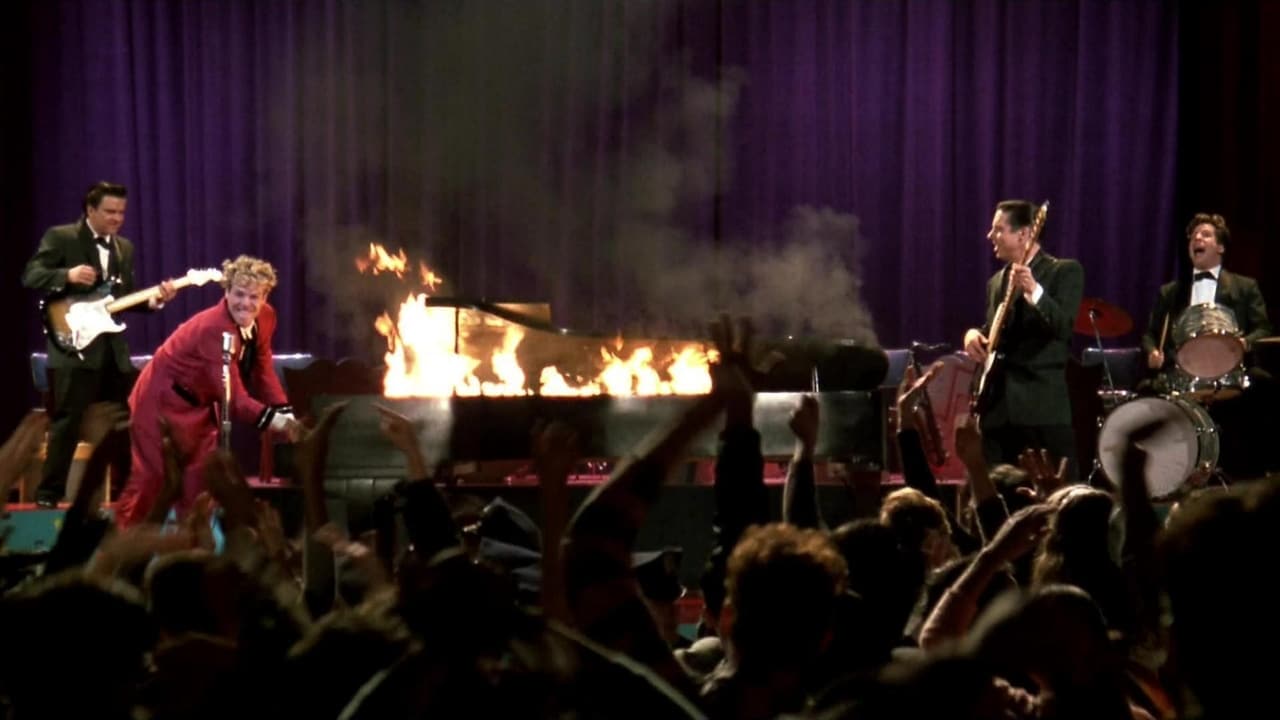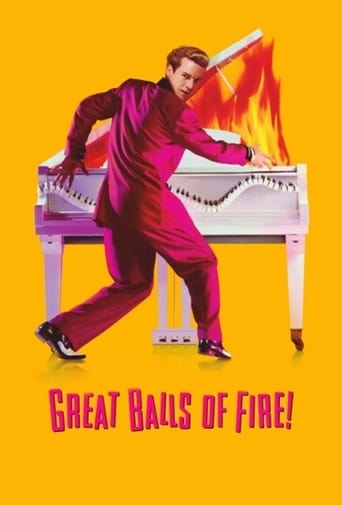ChampDavSlim
The acting is good, and the firecracker script has some excellent ideas.
Derry Herrera
Not sure how, but this is easily one of the best movies all summer. Multiple levels of funny, never takes itself seriously, super colorful, and creative.
Tyreece Hulme
One of the best movies of the year! Incredible from the beginning to the end.
Sienna-Rose Mclaughlin
The movie really just wants to entertain people.
LeonLouisRicci
The events that stopped the first wave of Rock n' Roll......Elvis went into the army...Buddy Holly died...Chuck Berry got arrested...Little Richard quit and became a man of the cloth...and Jerry Lee Lewis married his 13 year old cousin. This film is a fun-filled, rocking, over-the-top, snazzy, story of the "Killer". It never lets up on the music (all original performances by Jerry Lee) and the cast is doing nothing more than having a good time with it all. A few 50's style insertions of some "song and dance" numbers work magnificently.During the downfall, which is presented honestly and somberly we understand the devastation and effect on all involved. But just like Lewis himself, it rebounds with guts and gusto and never misses a color saturated beat.No one ever put out those great balls of fire, he played it hard and he played it forever."I can play anything, anytime, anywhere" says Jerry......ain't it the truth.
jc-osms
An energetic and colourful, if somewhat sanitised bio-pic of controversial 50's rocker, Jerry Lee Lewis. With few exceptions it seems, the lives of the first wave of rock 'n' roll greats took some mighty unusual twists and turns, but outside of the tragic death of Buddy Holly in early 1959, Jerry Lee's meteoric rise and fall probably contains more grist for a movie than any of them.Director McBride gives us a full-on take on Lewis' spectacular emergence and brief time when he appeared to be the number one challenger to the King Of Rock 'n' Roll title held by ex-Sun records label-mate, one Elvis Aaron Presley, but in truth, Lewis, whose first two hits are as good as anything Elvis himself mustered in his golden era in the 50's, was probably not good looking enough and certainly was too rebellious and unstable to really carry his fans with him thereafter, although a shrewd, no-nonsense manager like The King's much-criticised Colonel Tom Parker, might have helped.The film itself is highly stylised and is so apocryphal in its treatment of events that I had to make a decision to stop wincing at every convolution in the story-line - worst example, Elvis, Army satchel on his shoulder, dropping by Sun Studios to tell Jerry that he can have it all, i.e. his position as the King - and enjoy it as much as any other Hollywood bowdlerisation you can name. And did Jerry Lee ever really set fire to his piano over a disagreement with Chuck Berry...?Anyway, the depiction of the era is great, with T-birds cruising up and down the streets and the down-home feel of the legendary Sun Studios brought to life. The narrative tries to play up Lewis' contrasting relationship with his since disgraced evangelical Bible-punching cousin Jimmy Swaggert, but there's more of interest in the Killer's liaison with his thirteen year-old wife Myra. The film holds back a little on this sensitive subject, but in the end doesn't shirk it completely (impossible not to, really) and certainly gets across Lewis' self-destructive "kiss my ass" outlook, particularly during his ill-fated visit to England.Dennis Quaid gives the challenging role of maverick Lewis his all and even if he can't quite put across the undoubtedly darker side of Jerry Lee, his vitality (and spot-on lip-synching!), particularly in the musical numbers, makes up for this. The movie-stealer though is unquestionably Wynonna Ryder as his child-bride Myra, not yet a woman but still drawn to this wild man with a mixture of child-like wonder, innocence and curiosity.There's good support too with none of the acting jarring with the evocation of the period and even if the whole sometimes looks like a slightly heavied-up re-run of "Happy Days" with its choreographed dancing routines and occasional tricksy devices like for example the telephone wire split-screen device during a telephone conversation, all paying due homage to the era.As stated, this day-glo approach doesn't always serve Lewis' sometimes darker story too well but on the whole, Lewis deserved this affectionate tribute and no-one will question the greatness of his early music, which more even than this very entertaining movie, will be what we remember him by.
Andres Salama
This comic book like biopic about singer Jerry Lee Lewis (Dennis Quaid) rise to fame and subsequent fall from grace after his marriage with his 13 years old cousin Myra (a very young and very good Winona Ryder) was discovered, is probably not terribly true to life, but it is still very entertaining. Quaid happily hams it up in an over the top performance that has to do more with caricature than with acting. Alec Baldwin adds to the fun in his cameo as Jerry Lee's cousin, preacher Jimmy Swaggart. There is a nifty, idealized pop reconstruction of small town America in the 1950s. And the music, of course, is great. Best scene: staid English journalists raising a scandal when the singer and his teen wife arrive.
blanche-2
Dennis Quaid struts around like a rooster in "Great Balls of Fire," a 1989 biopic about Jerry Lee Lewis, one of the great entertainers. Discovered by Sam Phillips, the man who discovered Elvis and Johnny Cash, Lewis came up the ranks quickly and was poised to become the King of Rock 'n' Roll when Elvis went into the Army. But the scandal that broke when it was revealed he was married to his 13-year-old cousin Myra (Winona Ryder) and was in fact a bigamist - which today would be shrugged off - just about ruined his career. Soon he was prone to violence on and off stage and imbibing in alcohol.I have always loved Jerry Lee Lewis' music, but the only thing I knew about him was that he married his cousin - so that will show you where all the publicity was focused. I had no idea that Jimmy Swaggert (played here by Alec Baldwin) was also his cousin. I was struck by the qualities he had in common with Elvis - they both were highly-charged performers with so much energy a stage couldn't hold them, both completely original, natural talents inspired by music they heard in their communities, and both were discovered by Sam Phillips. What each one was most of all was just like one of the kids that he sang to, who could pulsate, dance and let their hormones run wild with the music. Lewis remains today an electrifying performer with an unmistakable sound. His high gear "Great Balls of Fire," "Breathless," "High School Confidential," and of course, "Whole Lotta Shaking' Going' On" are unmatched.Now, how accurate was this film? Jerry Lee himself claims he never acted the way Dennis Quaid portrayed him in his life, though others say Quaid was right on. It's a little like Scottish people hearing a Scottish burr on an actor and saying, we don't talk like that when they do. I will quibble with the depiction of Sam Phillips as a snake oil salesman who, according to this script, "lost Elvis." Phillips didn't lose Elvis - his record company was too small to promote Elvis as he needed to be promoted, and Phillips badly needed the money Elvis' contract would bring. Elvis, Vernon and Gladys Presley thought they had it good - no one dreamed Elvis could accomplish what he did - so Sam Phillips could have kept Elvis with Sun for a longer period of time, but rather than stifling Presley's career, he let him go.Quaid does an excellent job as a thrilling performer who perhaps isn't the most likable person off stage - in fact, might be a little sleazy - and Ryder captures the teenage silliness beautifully. Baldwin doesn't get to do much but proselytize.The most interesting thing about "Great Balls of Fire" is its relevance today. Rock 'n' Roll was perceived as the way to complete degradation for teenagers and the performers were servants of the devil. Rap music is viewed the same way today. With rock 'n' roll, the road to degradation was a sexual one - swinging those hips and getting all charged up could only mean trouble. Today, with rap, it's the message of violence against women and attitudes towards them, the use of violence and foul language. In between, we had the schools ruling that no one could have a Beatles haircut. Maybe someday it will occur to somebody that many things can destroy a generation - war and drugs being two - but music doesn't seem to be one of them.

